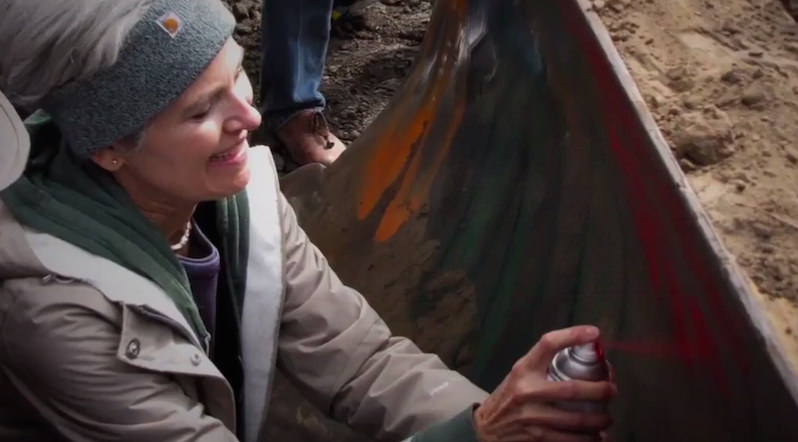Arrest Warrants Issued for Green Party’s Jill Stein and Ajamu Baraka (Multimedia)
The presidential nominee and her running mate spent much of the week in North Dakota protesting the Dakota Access pipeline. Now they face misdemeanor charges for acts committed during the protests.
Earlier this week, Green Party presidential nominee Jill Stein and her running mate, Ajamu Baraka, traveled to North Dakota to join the Standing Rock Sioux tribe’s protests against the Dakota Access pipeline (DAPL). At one point during the demonstrations, Stein spray-painted a bulldozer with the words “I approve this message.” Baraka spray-painted “decolonization” on other construction equipment. Each has since been charged with vandalism and trespassing.
Stein documented her participation in the demonstrations via Twitter:
I #StandWithStandingRock Sioux Chair David Archambault’s call to protect our water for generations to come. #NoDAPL pic.twitter.com/KanaMeFusZ
— Dr. Jill Stein (@DrJillStein) September 7, 2016
Honored to meet Dennis Banks, who showed the world Native Americans are still here. #NoDAPL #StandWithStandingRock pic.twitter.com/om618yv5oF
— Dr. Jill Stein (@DrJillStein) September 6, 2016
Water is life. @AjamuBaraka and I stand with these water warriors. #NoDAPL #ReZpectOurWater pic.twitter.com/WK8EB8RrKM
— Dr. Jill Stein (@DrJillStein) September 8, 2016
Stein labeled the DAPL “vandalism on steroids” in response to the charges pressed against her. On Wednesday, she defended her actions, reports the Omaha World-Herald:
The Green Party presidential candidate—who is eagerly courting former Bernie Sanders supporters—told an Omaha crowd on Wednesday that she had no choice but to spray-paint a bulldozer at an anti-pipeline protest in North Dakota after being asked to by Indian leaders.
Stein said she didn’t feel as if she could say “no” to such a simple request from people leading the fight against a crude-oil pipeline. …
“I felt like it was the least I could do in front of these Indian leaders, as they were putting their lives and their bodies on the line,” said Stein, who spoke at the Metropolitan Community College’s Fort Omaha campus.
“What they are doing there is not just rescuing our water supply, our climate and our planet, they’re also lifting up this incredible vision of community and forgiveness,” said Stein, who spent the weekend at the protest camp near Standing Rock Reservation.
As one Twitter user noted, this is not the first time Stein has faced charges for her political demonstrations:
.@DrJillStein was also arrested in 2012 for “trespassing” to help protesters stop another oil pipeline: Keystone XL https://t.co/J66Vgy8BCI
— Ben Norton (@BenjaminNorton) September 8, 2016
Stein has repeatedly called on President Obama and Hillary Clinton to address the DAPL protests, making the issue a focus of her own campaign this week. Meanwhile, a federal judge ruled Friday that the controversial construction would be allowed to continue—but the U.S. government decided not to proceed, despite the ruling. NPR reports:
In Friday’s ruling, U.S. District Judge James E. Boasberg acknowledged that “the United States’ relationship with the Indian tribes has been contentious and tragic.” But he went on to say that the Army Corps “likely complied” with its obligation to consult the tribe, adding that the tribe “has not shown it will suffer injury that would be prevented by any injunction the Court could issue.”
On the heels of that ruling, however, the Justice Department, the Department of the Army and the Interior Department announced that construction in an area of Army Corps’ land that is particularly sensitive to the tribe will not go forward pending further evaluation.
—Posted by Emma Niles
Your support matters…Independent journalism is under threat and overshadowed by heavily funded mainstream media.
You can help level the playing field. Become a member.
Your tax-deductible contribution keeps us digging beneath the headlines to give you thought-provoking, investigative reporting and analysis that unearths what's really happening- without compromise.
Give today to support our courageous, independent journalists.






You need to be a supporter to comment.
There are currently no responses to this article.
Be the first to respond.